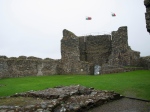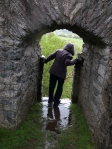Most writers have heard the old adage to “write what we know.” Research — in its many forms — can help us expand what we know in a way that improves the story and influences us as storytellers and as people.
For example, research that reveals the geography, history, and culture of a place can inspire characters, scenes, and situations in contemporary and historical fiction. Documents, databases, and even weather reports can be worth checking out. Two years ago at MagNet in Toronto, several speakers talked about articles beginning with a hunch or intuition, backed up with solid research. That same intuition works overtime in genres like science fiction, for example, where authors like Aldous Huxley, George Orwell, or H. G. Wells have been credited with inspiring our present.
At that MagNet conference, Glen McGregor of the Ottawa Citizen said data research can confirm the obvious, reveal the unexpected, and uncover stories even the subjects didn’t know were there. This certainly applies to nonfiction and creative nonfiction. For example, a series of letters found in an attic led Merilyn Simonds to write The Convict Lover, finalist for the 1996 Governor General’s Award. Research can also inspire fiction, like The Da Vinci Code by Dan Brown, a best-selling novel that opens by professing its accurate descriptions of art, architecture, documents, and secret rituals.
As a journalist as well as fiction and nonfiction writer, I’m naturally inspired by intuition and research. For the past five years, I’ve been working on a historical fantasy novel “Hawk” based in 1282 Wales. I’ve felt compelled to research the details of the time, as well as the culture, the geography, and the language. Through this research, I’ve been working on creating scenes with a sense of emotional as well as historical accuracy.
At a recent writers’ group meeting, our discussion turned to a question about research: how much is enough? How much research does the reader need, and when does the research become a clutter of detail?
I think the answer to this question is relative, based on the type of scene you’re writing, and possibly the learning styles and nature of the writer. Every detail has to serve the work, or it doesn’t belong there. In other words, even when I find a particular piece of information fascinating, I may only need one character instead of four, or a detail of the setting instead of a panoramic view.
The book Digging Deeper: A Canadian Reporter’s Research Guide suggests developing a research plan to outline such aspects as what kind of information I need and where it can be found. I’ve found that a research plan for fiction, like an outline, tends to expand and change over time, until it no longer fits its original parameters.
With “Hawk,” I’ve spent years combing through books and articles, requesting multiple interlibrary loans, consulting experts through interviews, searching Internet sites like Castles of Wales, and other Internet research. I also enjoy following up with primary research on-site. I’ve travelled to Wales and searched out several castles, including Harlech, Aberystwyth, Criccieth (see photo), Caernarfon, Conwy, Dolwyddelyn, Dinbych (Denbeigh), Beaumaris (twice), and Castell-y-Bere (see photo). As well, I’ve taken a Welsh language course with my daughter, and we’ve fallen in love with the towns and countryside of North and West Wales. Not to mention the sea.
I’m enjoying the opportunities to find out how much research is enough to fully realize my novel. The best of what I’ve discovered has led to many unexpected scenes, bits of action, and character detail. As well, I’ve been able to present my research in various ways, and I’m hoping to write more about my experiences in travel articles and possibly a nonfiction book.
What about you? Do you have a sense of when enough is enough in terms of your research? Does the research sometimes lead to other types of books, articles, or activities? Please leave a comment and let’s discuss it.
Thanks!
Marie Powell (http://mepowell.com/blog/, http://www.mepowell.com)
Marie Powell is the author of 13 children’s books with Scholastic Canada and Amicus Publishing, as well as short stories and poems appearing in such literary magazines as subTerrain, Room, and Transition. As a freelance professional writer, her articles appear in some 70 trade and consumer magazines across the country. She is currently at work on a historical fantasy novel, as well as other works of fiction.




I have so much fun doing research that I often have trouble making myself stop! I usually do general research on anything that strikes my fancy, until the story starts to shape itself in my head. Then I write a draft, figure out where the holes are, and do much more targeted research to plug them. It’s not scientific, but it seems to work!
Sounds good to me, Lindsey — Thanks for sharing your process!
I’ve been working on a longer manuscript since last spring. It’s the first time in my short writing career that I’ve had to do research. Some I had done ‘incognito’, in that I had earlier read books of personal interest that I found could be used in this piece of work. But in addition to that, I’ve used the local library, new and used bookstores, and the NFB, which I found quite helpful. How much is enough? I came to think that, if I keep researching, my novel will be really long!
Ted – Thanks for your comment. Films are a great research tool. Thanks for reminding us of that (although more BBC than NFB in my research.) I’m finding my research driven by the process of revisions, and driving my revisions as well.
Yes, a very interesting post, Marie. I wish I could have gone with you to all those Welsh places! Research obviously can be a lot of fun. But while it is true that continuing research can open up all kinds of new avenues to write about, and add increasing depth to our stories, at some point we have to stop or the story will never be done. I liked what you said about using the “extra” research in other writing. So how do you know when you’re done for a particular piece? When it feels “right enough?” When you’re tired of it and want to move on something new?
That’s such a good question, Sharon. For me, I never feel done with the research, but there is usually a moment when the scene starts to build and the characters’ actions become more important to me. Research can bring out the specific details that make a scene come alive, but I think it’s important to let the story drive the process. I feel driven to the research when I have a sense that something is missing or that I should push a given scene a little bit more. But it’s easy for me to get side-tracked in the details, so it’s important to keep the needs of the scene in my mind.
Great post, Marie! Personally, I love the randomness my research tends to take. I look up one thing which leads to another which leads to another – it may not end up helping what I was originally concerned about, but it’s always a unexpected harvest of ideas and possibilities for future writing.
So true! Random research is fun and can lead to new ideas. Dianne, do you have a way of keeping track of your research for future writing? I have tried printing it off, and storing info and sources on electronic research files. It’s getting to the point where I need some kind of organizational process to keep track of it for future use, especially for those bits of information or images that don’t relate to this project but catch my interest in some way, and I know I’ll want to follow up later.
I’ m rather old fashioned in this regard. I have a small journal in which I jot down ideas (1 per page). I might add the URL that gave me the idea. If I think I need to print the info, it goes into an appropriately labelled file folder. Works for me. 🙂
Thanks for sharing your process, Dianne. I’ve been trying to save URLs in doc files labeled “research,” but I like the journal idea too. My doc files usually end up in the same folder as my current project. This year I’m going to start a folder for research ideas, and see how that goes.
Marie, personally I’ve found that while we may think we’ve done enough research, I continue to stumble upon new paths (requiring further research) that open up my stories to become even closer to what they should be. I also feel that my prior research (though I may not use it all) has been highly beneficial. To me research is ongoing if you want to be authentic (I think of the fine details in Margaret Atwood’s novels). Congrats on learning Welsh and diving head-on into all things Welsh and wonderful, from a fellow-writer who spent a year living in Colwyn Bay, took a beginner Welsh language course and married a Welshman. Can’t wait to hear more about your book ‘Hawk’. I visited Castell y Bere twice – fantastic place for inspiration!
It’s great to hear from another fan of North Wales! I just found and enjoyed your blog. Where did you take your Welsh class? You know, it was pouring rain the day we found Castell-y-Bere — not that it stopped us — but I’d love to visit the site again and spend a day musing about life there. We stayed at Dolgellau and really loved the town, the Braich Goch mine, and everything we saw in the region. Thanks for connecting with me here!